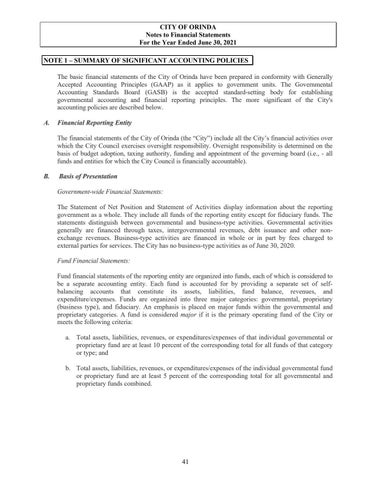CITY OF ORINDA Notes to Financial Statements For the Year Ended June 30, 2021 NOTE 1 – SUMMARY OF SIGNIFICANT ACCOUNTING POLICIES The basic financial statements of the City of Orinda have been prepared in conformity with Generally Accepted Accounting Principles (GAAP) as it applies to government units. The Governmental Accounting Standards Board (GASB) is the accepted standard-setting body for establishing governmental accounting and financial reporting principles. The more significant of the City's accounting policies are described below. A.
Financial Reporting Entity The financial statements of the City of Orinda (the “City”) include all the City’s financial activities over which the City Council exercises oversight responsibility. Oversight responsibility is determined on the basis of budget adoption, taxing authority, funding and appointment of the governing board (i.e., - all funds and entities for which the City Council is financially accountable).
B.
Basis of Presentation Government-wide Financial Statements: The Statement of Net Position and Statement of Activities display information about the reporting government as a whole. They include all funds of the reporting entity except for fiduciary funds. The statements distinguish between governmental and business-type activities. Governmental activities generally are financed through taxes, intergovernmental revenues, debt issuance and other nonexchange revenues. Business-type activities are financed in whole or in part by fees charged to external parties for services. The City has no business-type activities as of June 30, 2020. Fund Financial Statements: Fund financial statements of the reporting entity are organized into funds, each of which is considered to be a separate accounting entity. Each fund is accounted for by providing a separate set of selfbalancing accounts that constitute its assets, liabilities, fund balance, revenues, and expenditure/expenses. Funds are organized into three major categories: governmental, proprietary (business type), and fiduciary. An emphasis is placed on major funds within the governmental and proprietary categories. A fund is considered major if it is the primary operating fund of the City or meets the following criteria: a. Total assets, liabilities, revenues, or expenditures/expenses of that individual governmental or proprietary fund are at least 10 percent of the corresponding total for all funds of that category or type; and b. Total assets, liabilities, revenues, or expenditures/expenses of the individual governmental fund or proprietary fund are at least 5 percent of the corresponding total for all governmental and proprietary funds combined.
41




